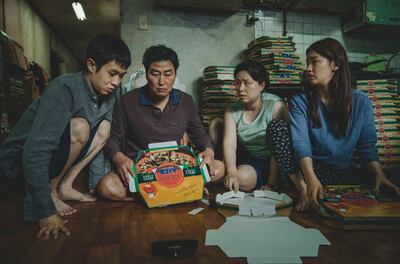With movie studios at a standstill, and people under quarantine desperate for content to watch, Netflix has unsurprisingly experienced a huge surge in viewership during the coronavirus pandemic.
In response to the lockdowns, three million new subscribers have signed up for Netflix in Latin America, as have 3.6 million in Asia, while in South-East Asia alone the use of the website has increased by 115 per cent.
But this is not just a lucky break. Sure, the current global crisis might have accelerated Netflix's international appeal and expansion, but over the past few years they have made a conscious effort to create more diverse and eclectic content from all different corners of the planet.

Back in March, Netflix released Queen Sono, the first of several expected original series aimed at the African market, which was shot entirely on the continent and comprised of a cast and crew from there, too.
Netflix has been just as busy in Asia, where the company now has offices in Tokyo, Seoul and Singapore. Its employees there have been tasked with tapping into the region's 600 million population. Unsurprisingly, their main aim has been younger viewers, as they are increasingly tech savvy, constantly hooked to their phones, love video content, and present a golden opportunity to grow Netflix's international audience.
Doing so has not been easy. Netflix has had to make a concentrated effort to break through the numerous languages and cultural differences that divide most of the continent's countries. One of the ways that Netflix has ensured their original shows have a universal appeal is by combining Western cinematic and storytelling influences with a South-East Asian authenticity.
Take a look at the three original Netflix shows from South-East Asia that are being released in the space of 24 hours, between Wednesday and Thursday this week.
South Korea's Extracurricular, which revolves around a student committing a series of crimes in order to fund his college tuition fees, combines a plot that is akin to Breaking Bad with the nihilism of Sex Education.
At the same time, Extracurricular is also able to explore social themes that have long blighted South Korea, like the wealth gap, male and female insecurities, as well as the youth's reliance on technology, especially when it comes to how much it can infiltrate and dominate their lives. Proving that Netflix clearly does not have a problem biting the hand that feeds it.
Taiwanese crime drama The Victim's Game is much more procedural in the mould of The Stranger, Cracker and Broadchurch, as it revolves around an unlikely pair of investigators hunting down a serial killer. That does not make it any less gruesome, though, as the murderer has a penchant for burning bodies, which allows the filmmakers to fully embrace the creative freedom given to them by Netflix.
Then there is Japan's The Forest Of Love: Deep Cut, which is actually an extended version of last years' popular crime film of the same name that has been broken down into several episodes. Something that Netflix had great success with when they turned Quentin Tarantino's The Hateful Eight into a four-part series back in May.

Most of East Asia being in self-isolation is not the only reason why Netflix will be feeling relatively pleased with the timing of these releases. They will be hoping these shows can tap into Parasite's unprecedented international success over the past few months. The deliciously dark comedy thriller became the first South Korean film to win the Palme d'Or at the Cannes Film Festival last year, which it then followed up by winning four Oscars at the 92nd Academy Awards, including Best Picture and Best Director.
Like Parasite, Extracurricular, The Victim's Game, and The Forest Of Love: Deep Cut all dive into the crime, thriller and mystery genres, with increasingly shocking results. This should only help to pique the interest of those that were wowed by Bong Joon-ho's film, which as well as winning all of those awards grossed $266 million worldwide to become the highest grossing South Korean film.
The numbers prove that Netflix clearly believes this region is a hot-bed of creative talent, because ever since their launch back in 2016, they have firmly backed the filmmakers in South-East Asia.
Netflix has invested in more than 180 original films and shows, worked with about 8,000 producers, filmmakers, cast and crew, while also filmed in 19 cities in only South Korea, as well as 12 other major metropolises in Malaysia, Thailand, and Japan, too.
Rather incredibly, because of South Korea's impressive response to the Covid-19 pandemic, Netflix are still able to film in the country at the moment, as well as in Iceland. Again, this puts them in a much superior position to their Hollywood rivals, who will have to wait for the American government to get the coronavirus under control before they can start filming again.


